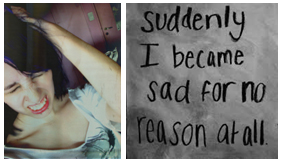 Everyone reading this has successfully navigated the adolescent stage and survived, not necessarily 100% unscathed, but at least you made it successfully to adulthood. But who didn’t have a dark thought or two during this confusing time? So many emotions, so many new experiences happening physically and mentally, so much pressure – self and culturally imposed – with no prior experience to guide each person on their own unique journey. This stage is really one that must be gone through alone; no one can spare you the teenage years and live life for anyone else!
Everyone reading this has successfully navigated the adolescent stage and survived, not necessarily 100% unscathed, but at least you made it successfully to adulthood. But who didn’t have a dark thought or two during this confusing time? So many emotions, so many new experiences happening physically and mentally, so much pressure – self and culturally imposed – with no prior experience to guide each person on their own unique journey. This stage is really one that must be gone through alone; no one can spare you the teenage years and live life for anyone else!
Many times the choices a teen makes are fine, just right, but they don’t always know that, and live in the throes of uncertainty, which can lead to despair, depending on the intensity of the personality. Teenage angst is more than just ‘moodiness’ – there are lots of technical hormones involved that makes this time a real physiological condition – in different degrees for different teens, but a distinct condition for all.
I was an overachiever from my toddler years, competitive and driven to succeed against the odds. In hindsight, it’s no surprise that when as a teen things didn’t always go my way against my very high self-standards, I floundered and flirted with despair. At one point, I did go very dark and saw suicide as a prime attention getter – there’s irrational teenage thinking at work! “They’ll really miss me when I’m gone!” is not sound thinking at all, but makes perfect sense to a kid who just wants to be recognized. My weak suicide attempt (swallowing a bottle of aspirin – the only ‘pills’ handy) barely registered on the radar, so that actually saved me. Not getting the expected reaction is a sad reflection, but at least I wasn’t motivated to try that again.
What was lacking in my adolescent years was a caring adult. Without a close teacher, coach, school counselor, parent, relative, or adult friend, I had no barometer to help develop my brain down the right path while it was in a highly formative stage. We now know that during adolescence, the brain goes through the second most active period for firing and wiring neurons, with infancy being the first highly active period. This means that an adolescent is truly operating with a brain that is still developing in the higher reasoning functions (occurring in the prefrontal cortex). A teen really doesn’t have the cognitive ability yet to make fully rational decisions, which helps to explain their sometimes wildly impulsive behavior (“What were you thinking doing that? You weren’t thinking at all!”)
COMMUNICATION TAKEAWAY: When a teen is going through a rough time the very best thing a caring parent can do is to pay attention and be there for them. Just letting the teen know that you care, that you support them in their normal struggle, that you love them unconditionally has a huge effect on helping the teen through a dark period. And if you can’t be helpful, because you’re too close, find another adult close to the teen to get involved. While love may not solve all the world’s problems that a teen may think he faces, it can go a long way in helping – certainly more than throwing up your hands in frustration and giving up emotionally on him. Note: refrain from saying, “I understand what you’re going through – I was a teenager once too” which is not comforting. Remember that every person’s journey through adolescence is unique and you don’t really understand your child’s unique experience.
